We’ve painted the red coats on our rocker in a few previous posts, so it’s time for the black:
Make sure you spoon the foam off the top of the paint. I do this every time I mix up paint. Some brands of paint have more foam than others.
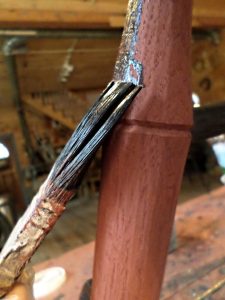 I’m trying to keep the black out of the grooves on these double-bobbin turnings, so hold the brush nearly parallel with the turnings.
I’m trying to keep the black out of the grooves on these double-bobbin turnings, so hold the brush nearly parallel with the turnings.
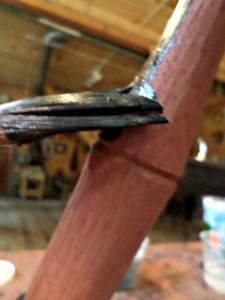 Holding it like this will get paint in the grooves. Don’t worry about this too much – it’s really easy to put red back in the grooves later.
Holding it like this will get paint in the grooves. Don’t worry about this too much – it’s really easy to put red back in the grooves later.
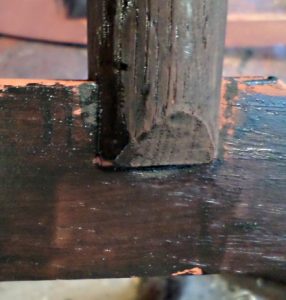 If you work the paint too hard you’ll mix the black and the red, making brown. Ick. Shellac between the black and red coats prevents this, but it also slows down how fast the paint dries. Shellac is probably a good idea the first few times you try it, but I don’t like how the paint looks as much.
If you work the paint too hard you’ll mix the black and the red, making brown. Ick. Shellac between the black and red coats prevents this, but it also slows down how fast the paint dries. Shellac is probably a good idea the first few times you try it, but I don’t like how the paint looks as much.
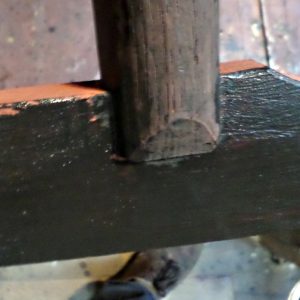 More paint on the brush and a light touch and I was able to fix the brown ick.
More paint on the brush and a light touch and I was able to fix the brown ick.
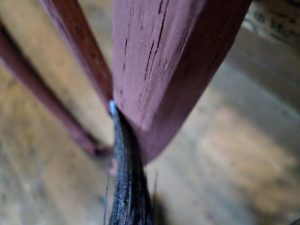 On the bow and spindles, hold the brush so just the tips of the bristles touch and move the brush along the length of the part. I like the look of all brush strokes as long as the lines run along the length of the piece.
On the bow and spindles, hold the brush so just the tips of the bristles touch and move the brush along the length of the part. I like the look of all brush strokes as long as the lines run along the length of the piece.
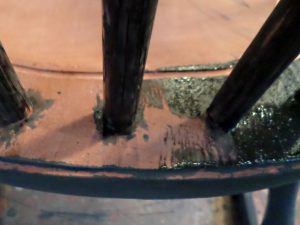 Getting in between the spindles is hard.
Getting in between the spindles is hard.
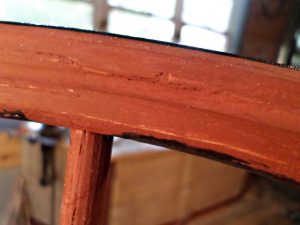 Watch for paint drooling onto adjacent surfaces – you’ll end up with a really dark line that you don’t want. Just hit the drool when the brush is relatively dry to spread it out.
Watch for paint drooling onto adjacent surfaces – you’ll end up with a really dark line that you don’t want. Just hit the drool when the brush is relatively dry to spread it out.
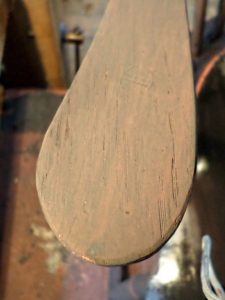 Here’s what the paint looks like after it has dried – nice and even.
Here’s what the paint looks like after it has dried – nice and even.
After the first coat of black has dried, I go back over the chair with a ‘streaking coat’, methodically painting 2/3 of the chair’s surface so more red shows in some spots than others. What you want are long lines of paint running along the length of your parts, as in the above photo. To do this, you need a fairly wet brush (by milk paint standards – not nearly dripping wet). You want to land just the tips of the bristles so that some of the bristles touch the wood and some don’t. This step is not nearly as dangerous as you’d think. If you haven’t already made a botch of the paint job, I doubt this coat will do it.
This brush stroke isn’t awful, but it’s more blotchy than the preceding photo.
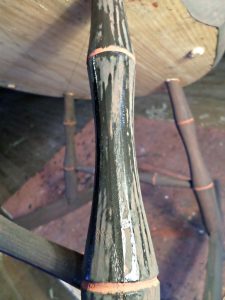 Here’s what the legs look like.
Here’s what the legs look like.
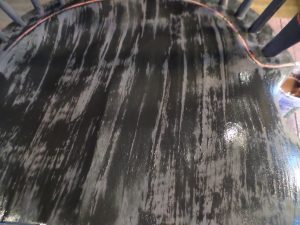 And the seat. Don’t go back and re-touch anything unless the paint is still wet, the brush is extremely dry and you just barely touch the surface. You don’t want the equivalent of three coats anywhere.
And the seat. Don’t go back and re-touch anything unless the paint is still wet, the brush is extremely dry and you just barely touch the surface. You don’t want the equivalent of three coats anywhere.
You can use an artist’s round brush to clean up any black in the grooves.
Like so. See, I have some drool and a paint run on the corner of my seat. Nothing’s perfect. Don’t stress over this paint job – they always look pretty good once you oil/shellac them.
Oak Rivings
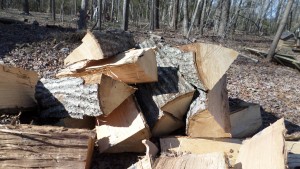
A 30″ red oak came down across my parent’s power lines during the hurricane last month (we got mostly rain here). A friend John Parkinson cut two beautiful white oaks to make room for his new shop. So, with the help of a local chairmaker, I’m going to start selling rivings again. Visit my website if you need any oak.
P.S. I promise I’ll get my class schedule up in the next week or two.

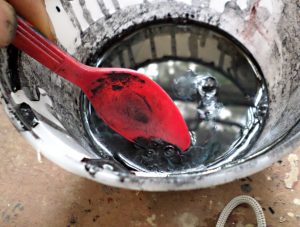
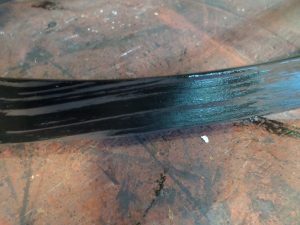
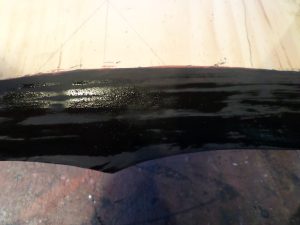
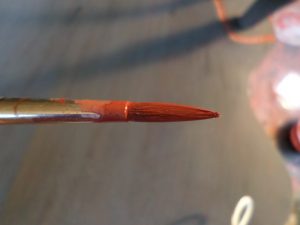
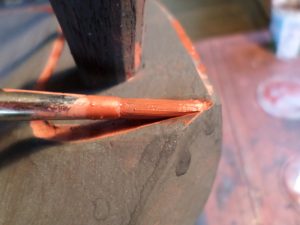
0 Comments